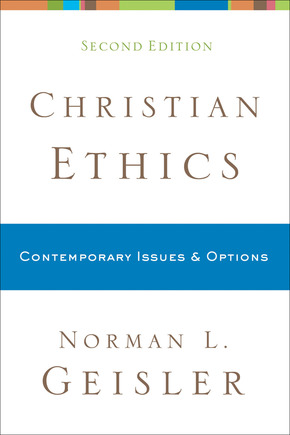A Brief Book Summary from Books At a Glance
By Steve West
Introduction
This second edition of Christian Ethics is an updated and expanded version of Geisler’s widely used text on ethics. Geisler examines different ethical systems and then analyzes a host of ethical issues. He points out strengths and weaknesses of the various views, and is clear about his own position. Geisler attempts to anchor his positions both biblically and philosophically.
Table of Contents
Part 1: Ethical Options
Chapter 1 All the Options
Chapter 2 Antinomianism
Chapter 3 Situationism
Chapter 4 Generalism
Chapter 5 Unqualified Absolutism
Chapter 6 Conflicting Absolutism
Chapter 7 Graded Absolutism
Chapter 8 The Basis for Ethical Decisions
Part 2: Ethical Issues
Chapter 9 Abortion
Chapter 10 Infanticide and Euthanasia
Chapter 11 Biomedical Issues
Chapter 12 Capital Punishment
Chapter 13 War
Chapter 14 Civil Disobedience
Chapter 15 Sexual Issues
Chapter 16 Homosexuality
Chapter 17 Marriage and Divorce
Chapter 18 Ecology
Chapter 19 Animal Rights
Appendix 1 Drugs
Appendix 2 Is Gambling Unethical?
Appendix 3 Pornography?
Appendix 4 Birth Control
Summary
Part 1: Ethical Options
Christian ethics is based on God’s will and character, which he expresses in divine commands. He has revealed his will both in nature and Scripture. Since God’s moral character is absolute, his moral commands are absolute and binding on everyone. God prescribes what we ought to do. Christian ethics are deontological. Six major view of ethics are antinomianism, generalism, situationism, unqualified absolutism, conflicting absolutism, and graded absolutism. These positions fall into two broader categories: nonabsolutism and absolutism. Antinomianism, situationism, and generalism are in the nonabsolutism class, and are not options for Christians.
Antinomianism is relativistic, holding that there are no moral absolutes and obligations. Hedonism and skepticism are antinomian. Utilitarianism and existentialism contributed to the rise of antinomian views, as did connecting ethics to evolutionary theory. Antinomians deny that God has given absolute laws, but some of them believe that there are local, temporal, subjective moral principles and laws which can be pragmatically useful. The stress of individual responsibility, emotions, relationships, and our subjectivity are helpful in the right context, but the antinomian framework is unsustainable. The larger philosophies in which antinomianism can be found all suffer from grave defects. Denying ultimate value is itself a value judgment. Antinomianism fails because it is too subjective and individualistic. There is no way to adjudicate claims, and irrationality is the result.
Situationism has various proponents, but Joseph Fletcher’s Situation Ethics is the most influential work. Fletcher argues that love is the one moral absolute. The only law is love, which Fletcher thinks cuts between antinomianism and legalism. Every other rule is relative and subordinate to love, and love is pragmatic. Love is to give without worrying about getting a return. How love works and what it is to do is relative to the situation. Only loving ends matter, and the ends justifies the means. Fletcher presents various cases where seemingly moral absolutes collide, and he argues that only love is a higher absolute that can be followed in ethical dilemmas. It is meritorious that this position is normative, and it is absolutist (with only one absolute). Further strengths are that it takes situations seriously, values people, and finds a way to deal with conflicting demands. His one absolute, however, is so broad and general it is little better than nothing at all. Being told to do the loving thing isn’t any more helpful than being told to do the good or right thing. It is also possible that there are more moral absolutes than just one. Furthermore, in situationism there are no grounds for determining which norm ought to be the highest; perhaps always telling the truth should be the one absolute. Fletcher is really a utilitarian, with all of the inadequacies that that position entails.
Generalism is the position that that there are moral norms, but they are generally rather than universally binding. Utilitarians believe there are general rather than absolute moral laws. There may be absolute ends, but only general and relative means to those ends. Bentham believed we should maximize happiness and minimize pain. John Stuart Mill defined pleasure qualitatively, and argued that there are higher pleasures and lower ones. He also argued that. . .
[To continue reading this summary, please see below....]The remainder of this article is premium content. Become a member to continue reading.
Already have an account? Sign In
Buy the books

Christian Ethics: Contemporary Issues & Options